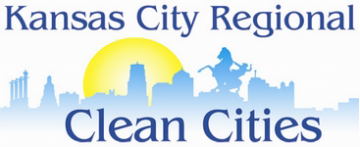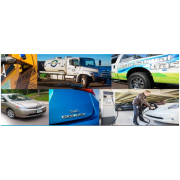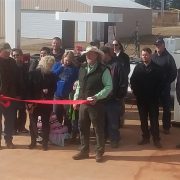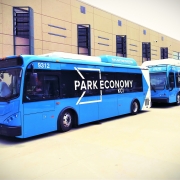US DOE Honors Kansas City Leader For Clean Cities Success
Kansas City Regional Clean Cities Coordinator Kelly Gilbert Inducted into Clean Cities Hall of Fame
KANSAS CITY – The U.S. Department of Energy (DOE) honored Kansas City Regional Clean Cities Coordinator Kelly Gilbert for her dedication and outstanding accomplishments in reducing Missouri and Kansas’s dependence on petroleum in transportation. DOE’s National Clean Cities Director Dennis Smith and Co-Director Linda Bluestein inducted Gilbert into the Clean Cities Hall of Fame on Thursday, August 24, while in Golden, Colo., where representatives from nearly 100 Clean Cities coalitions from across the country gathered for the 2017 Clean Cities Coordinator Workshop.
Gilbert began her work with Kansas City Regional Clean Cities nine years ago and has since led the coalition to leave a monumental impact on the region it serves. In 2016 alone, the coalition averted more than 34,000 tons of greenhouse gases and saved more than 9.7 million gasoline gallon equivalents of petroleum through the deployment of alternative and renewable fuels, advanced vehicles, idle reduction, and fuel economy improvements.
“Kelly has a unique ability for building lasting connections that benefit the program,” Bluestein said. “There is no doubt that she has made a lasting impact on the local alternative fuel market in the Kansas City region.”
Gilbert rose through the Clean Cities ranks quickly, beginning to work with the coalition in 2008, becoming Coordinator in 2009, Director of Transportation Programs at nonprofit Metropolitan Energy Center in 2010, and is now its program director. Every step along the way she’s been a leader and an innovator.
She secured and oversaw four U.S. Department of Energy grants including the Midwest Region Alternative Fuels Project in 2009 and the EV Community Readiness “Electrify Heartland” project in 2011. She banded together four states—Missouri, Iowa, Nebraska, and Kansas—for the 2012/2013 Mid America Collaborative for Alternative Fuels Implementation or “MAC” project. The grant allowed Kansas City Regional, St. Louis, and Iowa Clean Cities to establish a fleet recognition program called “Mid-America Green Fleets.” More recently, she managed the Safe Alternative Fuels Deployment in Mid-America project, which partnered with two University Fire Institutes in Kansas and Missouri to establish first responder training for compressed natural gas and propane vehicles. The training is now available nationwide to state fire training directors for use in their programs.
In addition to all of these projects, Gilbert has worked closely with Kansas Soybean Commission on biodiesel outreach and training, helped school districts and local governments access Congestion Mitigation and Air Quality Improvement funds, and directed Diesel Emission Reduction Act funds to local freight projects. Representing the Kansas City Regional coalition, Gilbert has established herself as a key player.
“It is a tremendous honor to be recognized by the Clean Cities community. I’m proud to be part of a network that, working largely out of the limelight and without huge budgets, has done so much to improve air quality, encourage new technologies and partnerships, and make a real, measurable difference in improving the environment that all Americans share,” said Gilbert.
Kansas City Regional Clean Cities is a program of Missouri nonprofit Metropolitan Energy Center and is a designated member of the U.S. Department of Energy’s Clean Cities program. Clean Cities advances the nation’s economic, environmental, and energy security by supporting local actions to cut petroleum use in transportation. A national network of nearly 100 Clean Cities coalitions brings together stakeholders in the public and private sectors to deploy alternative and renewable fuels, idle-reduction measures, fuel economy improvements and emerging transportation technologies. For more information, visit metroenergy.org, cleancities.energy.gov and cleancities.energy.gov/hall-of-fame.







